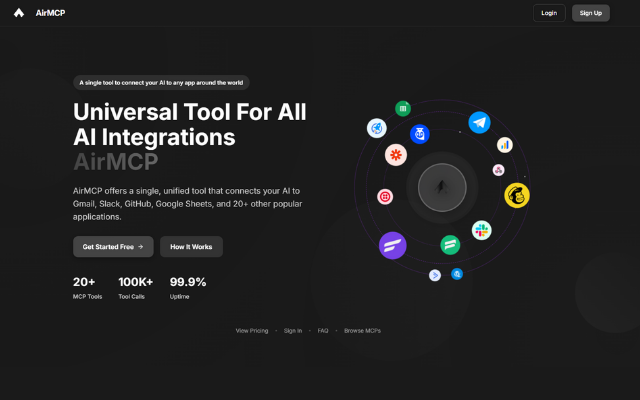Table of Contents
Overview
In the expanding landscape of AI integration tools, connecting intelligent systems to real-world applications often requires significant development effort and technical expertise. Air MCP is a specialized AI integration platform designed to address this challenge by implementing the Model Context Protocol (MCP) standard. This platform enables AI systems to connect with popular business applications through a standardized interface, reducing the complexity typically associated with custom integrations. Air MCP serves as a centralized solution for organizations seeking to implement AI connectivity across their existing software ecosystem.
Key Features
Air MCP incorporates several core capabilities designed to streamline AI integration processes and reduce technical barriers.
- Centralized Connection Management: Provides a unified dashboard for overseeing and managing AI connections to various applications and services, offering visibility across all integration points.
- User and Data Management: Implements comprehensive user access controls and data flow management, ensuring secure and organized operations across integrated systems.
- Streamlined Configuration: Features an intuitive interface for setting up and customizing integrations, significantly reducing the time and technical knowledge typically required for AI connectivity.
- MCP Assistant Integration: Includes an intelligent assistant that provides step-by-step guidance throughout the integration process, making complex AI setups more accessible to users.
- Standards-Based AI Connectivity: Leverages the Model Context Protocol to connect AI systems to business applications without requiring custom development work.
How It Works
Air MCP operates through a systematic approach that prioritizes ease of implementation while maintaining technical robustness. Users begin by configuring desired connections through Air MCP’s management interface, which provides guided setup processes for supported applications. The platform manages authentication and data flows centrally, ensuring consistent security and operational standards across all integrations. Through MCP standard implementation, the system enables AI models to communicate with external applications using standardized protocols. The integrated MCP assistant provides contextual guidance, helping users navigate configuration options and troubleshoot integration challenges without requiring extensive technical expertise.
Use Cases
Air MCP addresses specific scenarios where AI systems need reliable, secure connections to business applications and data sources.
- Business Application AI Integration: Connect AI models with CRM systems, project management tools, and marketing platforms to automate workflows and enhance decision-making processes across organizational functions.
- Centralized API Connection Management: Streamline the management of multiple API endpoints and external services, providing a unified interface for AI systems to interact with diverse business tools.
- Cross-Platform Data Synchronization: Ensure consistent and current information across AI systems and business applications, eliminating manual data transfers and reducing integration discrepancies.
- Rapid AI Deployment: Accelerate the implementation of AI solutions by removing traditional development barriers associated with connecting AI models to existing business infrastructure.
Pros \& Cons
Advantages
- Reduced Technical Complexity: Eliminates the need for custom coding and integration development, making AI connectivity accessible to users without extensive programming expertise.
- Centralized Management: Provides a single control point for all AI connections, users, and data flows, simplifying oversight and maintenance across organizational systems.
- Standards-Based Architecture: Built on the Model Context Protocol, ensuring compatibility with emerging AI tools and future-proofing integration investments.
Disadvantages
- Platform-Specific Limitations: Functionality is constrained by the applications and services currently supported within the Air MCP ecosystem, potentially requiring alternative solutions for specialized or niche tools.
- Service Dependency: As a cloud-based platform, functionality and performance depend on Air MCP’s infrastructure availability and ongoing platform maintenance and updates.
How Does It Compare?
In the competitive landscape of AI integration platforms, Air MCP positions itself as a specialized solution focused specifically on MCP standard implementation. Zapier has evolved significantly in 2025, introducing AI Agents, multimodal AI capabilities, and an AI-first pricing model, serving over 6,000 app integrations with broad automation functionality beyond AI-specific use cases. Make provides visual-first automation with 400+ pre-built AI integrations and autonomous AI Agents, targeting users who prefer graphical workflow design over code-based approaches.
n8n has transformed into an AI-native platform with extensive LangChain integration and 70+ AI-focused nodes, appealing to technically-oriented users who value open-source flexibility and self-hosting capabilities. AWS API Gateway with Bedrock AgentCore Gateway offers enterprise-grade AI integration with automatic REST API to MCP server conversion, designed for organizations requiring robust security, scalability, and comprehensive cloud ecosystem integration.
Air MCP differentiates itself through its exclusive focus on MCP standard implementation and AI-specific connectivity requirements. While established platforms offer broader automation capabilities and larger integration ecosystems, Air MCP provides specialized functionality for organizations prioritizing MCP compatibility and AI-native workflows. The optimal choice depends on specific technical requirements, organizational size, and the importance of MCP standard compliance versus broader automation capabilities.
Final Thoughts
Air MCP represents a focused approach to AI integration challenges, addressing the specific needs of organizations seeking to implement MCP-compliant AI connectivity across their business applications. Its emphasis on the Model Context Protocol standard and AI-specific integration requirements provides value for users prioritizing emerging AI standards and streamlined connectivity. While operating in a competitive market with established players offering broader automation capabilities, Air MCP’s specialization in MCP implementation and AI-native integration offers distinct advantages for organizations aligned with these technical directions. The platform’s continued success will likely depend on the broader adoption of MCP standards and its ability to expand supported integrations while maintaining its specialized focus.
